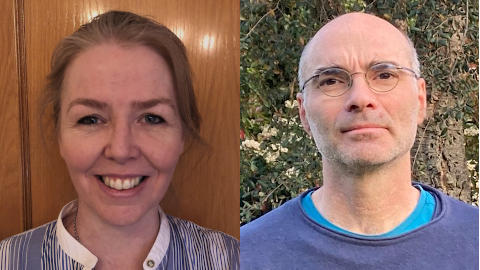Miranda Lubbers and Xavier Tolsa obtain an ERC Advanced Grant
Miranda Jessica Lubbers, from the Department of Social and Cultural Anthropology, and Xavier Tolsa, from the Departmen of Mathematics, have each been awarded an Advanced Grant from the European Research Council (ERC).

The ERC recently announced the selected candidates of the latest call for Advanced Grant. A total of 209 top scientists from across Europe will use this funding (507M Euros) from the European Union to explore some of the most innovative research ideas. The number of applicants was very high: 2,678 research proposals were submitted, of which 8% were finally awarded grants. The Advanced Grants are addressed to top scientists, well established in their careers and leaders in their fields of research.
ICREA researcher from the UAB Department of Mathematics Xavier Tolsa was awarded an Advanced Grant for the development of his scientific project Geometric Analysis and Potential Theory (GAPT), which aims to study different mathematical analyses combining harmonic analysis methods, geometric measure theory, and potential theory. Some of these issues deal with harmonic measure, caloric measure, rectifiability, and certain related free border problems. Although in recent years several advances have been made in these fields, there are still many unsolved problems that this project aims to study.
Xavier Tolsa received his PhD in Mathematics from the UAB in 1998. After spending a year at the University of Göteborg and another at the Université de Paris-Sud, in 2001 he became part of the UAB Department of Mathematics under a Ramon y Cajal grant, and in 2003 he became an ICREA researcher and continued on with the UAB. His research focuses on the area of mathematical analysis, and specifically on harmonic analysis, geometric measure theory, potential theory, and other related areas. The results of his research have helped to solve numerous open problems, such as the Painlevé problem for bounded analytical functions (posed at the start of the 20th century), and the demonstration of the semiadditivity of analytical capacity, speculated in the 1960s. In other recent collaboration projects, he worked on solving the David-Semmes problem, a two-phase problem for harmonic measures, and Carleson's epsylon^2 conjecture. His results have led to several awards, such as the 2002 Salem Prize, the 2004 European Mathematical Society Prize, the 2019 Rei Jaume 1 Prize for basic research. In 2012, he had also received an ERC Advanced Grant.
Fellow researcher from the UAB Department of Social and Cultural Anthropology and director of the GRAFO research group, Miranda Jessica Lubbers, was also awarded an Advanced Grant for her project A Network Science Approach to Social Cohesion in European Societies (PATCHWORK). The research will develop a new approach to social cohesion based on the science of networks and the researcher's previous trajectory in this field. The methodology will be implemented in a survey being conducted in five European countries and then all surveys will be compared with each other. The survey will be combined with in-depth interviews aimed at better understanding the formation and functioning of these networks, as well as participants' cognitive perception of them. Based on the estimation of the surveys, networks will be simulated at society-level to explore the resulting structures at macro-level. The project will shed light on the cohesion of acquaintance-based networks based on divosory lines of citizenship, social class, religion and political orientation in different European societies and their effects on tolerance, social confidence, and acceptance of diversity. The project will be conducted at the UAB Department of Anthropology and will enable the research group to hire five pre-doctoral and post-doctoral researchers.
Doctor Miranda Lubbers is Associate Lecturer of the Department of Social and Cultural Anthropology at the Universitat Autònoma de Barcelona (UAB) and ICREA Acadèmia researcher. She is director of the Research Group on Fundamental and Oriented Anthropology (GRAFO). She received her PhD in Social Sciences from the University of Groningen, the Netherlands. She is a former Ramón y Cajal researcher and has directed and participated in research projects for the "laCaixa", the Netherlands Organisation for Scientific Research, the Spanish Ministry for Science and Innovation and the European Science Foundation. She also is a consultant to international research projects. Her work has been published in journals such as the International Migration Review, Social Networks, Global Networks, Human Nature and the Annals of the American Academy of Political and Social Sciences. She is member of the DÉs membre de la Junta Directiva de la Xarxa Internacional d'Anàlisi de Xarxes Socials (INSNA), i editora associada dels consells editorials de les revistes Social Networks i Social Inclusion. She has been accredited as an advanced researcher since 2017.
In relation to the centres pertaining to the UAB Sphere, an Advanced Grant was also given to ICREA lecturer Daniel Maspoch, head of the Supramolecular Nanochemistry and Materials group at the ICN2, which will be used to fund CLIPOFF-CHEM project focused on revolutionising the world of chemical synthesis by proposing a top-down synthesis based on the control of molecular-level breakage of preformed structures and molecules. Professor Maspoch recently published a highly impacting resarch in the field of Metal-Organic Frameworks (MOFs), materials with a high porosity.
More information:
European Research Council website